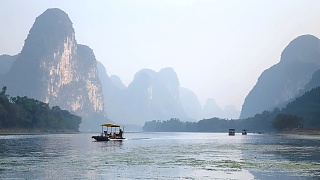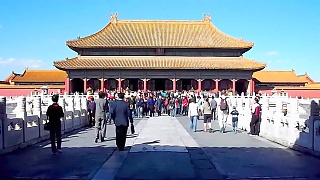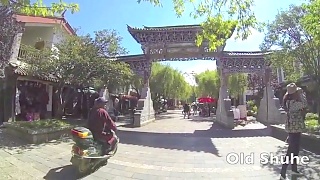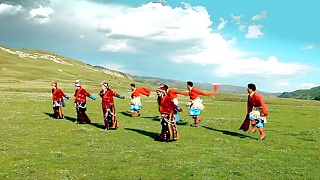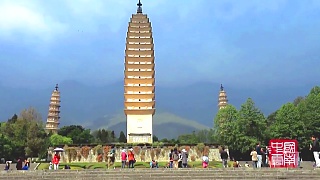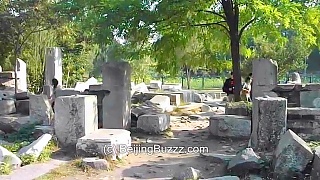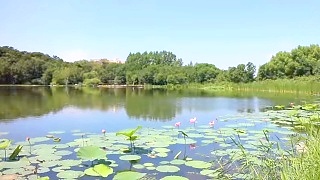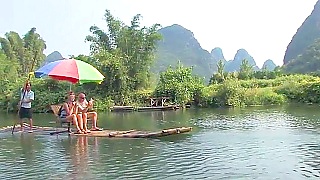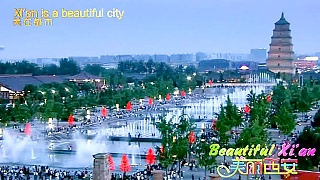With Sun Kissed Bucket List ...
[640],shadow=true,start=,stop=Lijiang Visitor Guide
Lijiang, in northwest Yunnan Province, is one of China's most scenic and culturally rich towns. Famous for its ancient town, UNESCO World Heritage Site status, and the surrounding natural beauty, Lijiang offers travelers a mix of historical exploration and outdoor adventure. The town is home to the Naxi ethnic group and features cobblestone streets, flowing canals, and traditional wooden houses, making it a must-visit destination.
Overview
- Location: Lijiang is located in Yunnan Province, about 150 kilometers from Dali and 500 kilometers from Kunming.
- Famous For: Lijiang Old Town, Jade Dragon Snow Mountain, Naxi culture, and outdoor adventure opportunities.
Getting There
- From Kunming: You can fly directly to Lijiang Sanyi Airport (1-hour flight) or take an overnight train (8-9 hours).
- From Dali: A bus or train ride from Dali to Lijiang takes about 2-3 hours.
- Best Time to Visit: The best months to visit Lijiang are from March to May and September to November when the weather is mild and dry.
Top Attractions in Lijiang
- Lijiang Old Town (Dayan Ancient Town): A UNESCO World Heritage Site, Lijiang Old Town is known for its well-preserved ancient buildings, narrow stone streets, and vibrant Naxi culture. You’ll find traditional wooden houses, small canals flowing through the town, and plenty of small shops and restaurants.
- Mu's Residence (Mu Fu): This grand residence was the home of the Mu family, who ruled Lijiang for centuries. The residence is a fine example of Ming Dynasty architecture combined with Naxi design. Climb to the top for panoramic views of the Old Town.
- Jade Dragon Snow Mountain (Yulong Xueshan): A towering mountain range just outside Lijiang, Jade Dragon Snow Mountain is perfect for hiking, cable car rides, and stunning glacier views. The mountain is sacred to the Naxi people and a symbol of their culture.
- Black Dragon Pool (Heilongtan Park): Located just outside Lijiang Old Town, this park offers a peaceful retreat with a beautiful view of Jade Dragon Snow Mountain reflected in the lake. It's a popular spot for photographers and nature lovers.
- Shuhe Ancient Town: A smaller, quieter ancient town about 4 kilometers from Lijiang Old Town. Shuhe offers a more relaxed experience with fewer crowds, featuring similar architecture and charm.
Cultural Experiences
- Naxi Culture: Lijiang is home to the Naxi ethnic group, who have a rich cultural heritage. Visit the Dongba Cultural Museum to learn about the Naxi language, religion, and customs. You can also witness traditional Naxi music performances at various venues around town.
- Naxi Ancient Music: This unique musical form dates back to the Tang and Song dynasties. A performance of Naxi ancient music is a great way to experience the traditional sounds of the region, often accompanied by cultural storytelling.
Local Delicacies
- Lijiang Baba (丽江粑粑): A thick, crispy pancake made with wheat flour and stuffed with either savory or sweet fillings. This local snack can be found in street markets and small restaurants throughout Lijiang.
- Sanyue Rice Noodles (三月丽江米线): A popular rice noodle dish typically served with a spicy broth, pork or beef, and fresh herbs.
- Naxi BBQ: Grilled meats and vegetables, served with local spices and dipping sauces. It’s a common street food, especially in Shuhe Ancient Town.
- Butter Tea (酥油茶): A staple among the Naxi and Tibetan people in the region, butter tea is a rich, savory drink made from tea leaves, yak butter, and salt.
- Rose Petal Cake (玫瑰饼, méiguī bǐng): Similar to XiZhou, Lijiang also features the famous rose petal cake. It's a delicately sweet pastry filled with locally sourced rose jam, and it's a popular souvenir for visitors.
Where to Stay
- Local Guesthouses: Lijiang has many family-run guesthouses located within the Old Town, offering traditional architecture and a cozy atmosphere. These are ideal for an authentic cultural experience.
- Boutique Hotels: For a more luxurious stay, boutique hotels with modern amenities are also available, often featuring beautiful views of the mountains or the Old Town.
Tips for Visitors
- Language: Mandarin Chinese is spoken by most people, but the local Naxi dialect is also common. English is not widely spoken, so it’s helpful to have a translation app or basic Mandarin phrases.
- Respect Local Customs: When visiting religious sites or interacting with locals, be respectful of their customs. Dress modestly, especially when entering temples or Naxi family homes.
- Shopping: Lijiang is known for its handcrafted silverware, Naxi embroidery, and traditional wood carvings. Support local artisans by purchasing souvenirs from the local shops or markets.
Nearby Attractions
- Tiger Leaping Gorge: One of the deepest gorges in the world, Tiger Leaping Gorge is a popular trekking destination about 60 kilometers from Lijiang. The hike offers dramatic views of the gorge and the Jinsha River below.
- Baisha Village: An ancient Naxi village about 10 kilometers from Lijiang. It’s famous for its ancient murals, which depict scenes from Naxi mythology and daily life. The village is much quieter than Lijiang, making it a peaceful side trip.
Conclusion
Lijiang is a destination that seamlessly blends cultural heritage with breathtaking natural landscapes. Whether you’re exploring the ancient streets of Lijiang Old Town, hiking the trails of Jade Dragon Snow Mountain, or learning about the unique Naxi culture, Lijiang offers something for every traveler. Plan your visit carefully to experience the best of both worlds—ancient history and outdoor adventure.
Lijiang, located in the northwest of Yunnan Province in southwestern China, is a picturesque ancient town renowned for its stunning natural scenery, rich cultural heritage, and well-preserved traditional architecture. Here's a guide for tourists visiting Lijiang:
Historical and Cultural Significance:
Ancient Town: Lijiang Old Town, a UNESCO World Heritage site, is a well-preserved ancient town with a history dating back over 800 years. It was an important stop on the ancient Tea Horse Road, a trading route connecting Yunnan with Tibet and Southeast Asia.
Naxi Culture: Lijiang is home to the Naxi ethnic minority, whose rich cultural heritage is reflected in the town's architecture, music, and customs. Visitors can experience Naxi culture through traditional music performances, local festivals, and visits to Naxi villages.
Top Attractions:
Lijiang Old Town: Explore the cobblestone streets, winding alleys, and historic buildings of Lijiang Old Town, which is renowned for its traditional Naxi architecture, wooden houses, and flowing canals. Highlights include the ancient Mu Residence, Black Dragon Pool Park, and Sifang Street.
Jade Dragon Snow Mountain: Towering over Lijiang, Jade Dragon Snow Mountain is a majestic snow-capped mountain range known for its breathtaking scenery and diverse ecosystems. Visitors can take a cable car ride to the mountain's summit, hike along scenic trails, and enjoy panoramic views of the surrounding landscape.
Lijiang Mural: Baisha Village: Baisha Village, located near Lijiang, is home to a collection of ancient murals dating back to the Ming Dynasty. These exquisite frescoes depict scenes from Chinese mythology, religious rituals, and daily life, providing insights into the region's cultural heritage.
Tiger Leaping Gorge: Located about 60 kilometers north of Lijiang, Tiger Leaping Gorge is one of the deepest river canyons in the world and a popular destination for hiking and outdoor adventure. Visitors can trek along scenic trails, admire dramatic cliffs and waterfalls, and experience the natural beauty of the gorge.
Culinary Delights:
Yunnan Cuisine: Lijiang is known for its diverse and flavorful Yunnan cuisine, which features fresh ingredients, bold flavors, and influences from neighboring regions. Visitors can sample local specialties such as Yunnan hot pot, crossing-the-bridge noodles, and yak meat dishes at restaurants and street food stalls throughout the town.
Old Town Snacks: Explore the bustling markets and food stalls of Lijiang Old Town to discover a wide variety of snacks and delicacies, including fried cheese, sweet pastries, and rice cakes. Don't miss the opportunity to try local specialties like yak butter tea and rose-flavored desserts.
Practical Tips:
Weather: Lijiang enjoys a mild climate year-round, with cool summers and chilly winters. The best time to visit is during the spring (March to May) and autumn (September to November) when the weather is pleasant and the scenery is beautiful.
Altitude: Lijiang is situated at a high altitude, so visitors should take precautions to prevent altitude sickness, such as staying hydrated, avoiding strenuous activity, and acclimatizing gradually.
Transportation: Getting around Lijiang is convenient with its network of public buses, taxis, and bicycles. Many attractions in and around the town can be explored on foot or by bicycle, while taxis and buses provide transportation to more distant locations.
Accommodation: Lijiang offers a wide range of accommodation options, including boutique hotels, guesthouses, and traditional courtyard homes. Staying in Lijiang Old Town allows visitors to immerse themselves in the town's historic atmosphere and vibrant culture.
Lijiang offers a captivating blend of natural beauty, cultural heritage, and traditional charm, making it an enchanting destination for tourists seeking to explore the treasures of Yunnan Province. Whether marveling at ancient architecture, hiking through majestic mountains, or savoring local cuisine, Lijiang has something to offer for every traveler.

 LiJiang visitor guide, YunNan province
LiJiang visitor guide, YunNan province